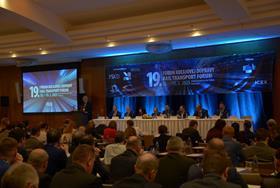Slovaks Embrace Government Support for Rail Development Amid Ongoing Funding Gaps
SLOVAKIA: The 19th FKD railway conference in Bratislava on March 18-19 highlighted the importance of international collaboration and increased funding for infrastructure. Toma bačić shares insights from the event.
As a vital rail transit hub,Slovakia’s network is intricately linked wiht its neighbors. Speakers at the conference urged both local and European leaders to continue supporting rail investments. Dr. Libor Lochman, former Executive Director of CER, kicked off the discussions by advocating for a new round of funding through the EU’s Connecting Europe Facility (CEF). Though, sources in Brussels suggest uncertainty looms over CEF’s renewal due to competing demands for defense spending and member states pushing for more control over project prioritization.
Despite these challenges, Lochman expressed optimism that upcoming EU budgets would allocate at least €100 billion from 2024 to 2029 towards co-funding initiatives. He emphasized prioritizing advancements like ERTMS, FRMCS, and digital automatic couplers while also pushing for progress on pan-European digital Capacity Management regulations.
Challenges Ahead
While EU funding presents opportunities,representatives from Slovakia’s national freight operator and infrastructure manager outlined notable hurdles facing their rail sector.
ŽSR Director-General Alexander Sako acknowledged goverment support but pointed out that demographic shifts pose risks to stability within his organization as employees age—many nearing retirement age. He stressed the need for stronger partnerships with universities and vocational schools to tackle this impending workforce gap.
Sako highlighted ongoing modernization efforts at 30 stations—including upgrades at Bratislava’s main station—funded through a mix of EU contributions and national resources. Yet he noted that neighboring countries have substantially higher capital expenditure budgets: Austria invests around €3.5 billion annually while Czech republic allocates about €1.8 billion; Slovakia’s budget stands at just €450 million—a record high but still insufficient compared to its peers.
Collaboration in Freight Transport
Jaroslav Daniška, Managing Director of ŽSSK Cargo, shared insights into his company’s multifaceted role beyond freight transport—it also involves maintaining rolling stock and managing transshipment terminals near Ukraine’s border.
“The future hinges on innovation and sustainable transport,” he remarked enthusiastically about embracing upcoming challenges. Daniška called for enhanced collaboration both domestically and internationally: “Together we can create an efficient modern rail system that bolsters Central Europe’s economy.”
- Stay tuned: In-depth interviews with ŽSR and ZSSK leaders will be featured in Insights this May!


Comments are closed, but trackbacks and pingbacks are open.